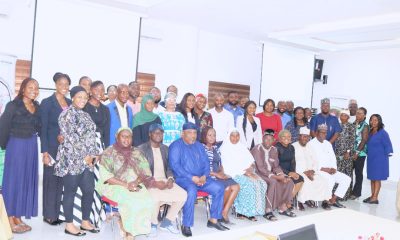Health
World Autism Day: Neurologist Wants More Facilities, Professionals to Attend to Autistic Children

Dr Martin Adeyemi, a Canada-based Paediatric Neurologist, has called for increased facilities and trained professionals to attend to autistic children in the country.
He gave the advice in an interview with newsmen on Monday, in commemoration of the 2022 World Autism Day, which is annually marked on April 2 around the globe to raise awareness about the condition.
The 2022 theme of the awareness day is “Inclusion in the Workplace” so as to focus on individuals who have personally undergone the difficulties and witnessed new probabilities in the workplace.
Autism, also called Autism Spectrum Disorder (ASD), is a broad term used to describe a group of neuro-developmental conditions, characterised by difficulty in social interaction and communication, restricted or repetitive patterns of thought and behaviour.
According to the World Health Organisation (WHO), autism is a lifelong neurological condition that affects how people interact with the world around them.
Most commonly, autism can influence how people communicate, form relationships and behave; yet each person’s experience will vary a lot.
While some autistic people may only experience mild signs, others will have severe symptoms that can affect their daily activities because symptoms differ.
Autistic people may find it hard to communicate and interact with others, find it hard to understand how other people think or feel, find things like bright lights or loud noises overwhelming, stressful or uncomfortable.
Autism was identified in the 1940s but was not widely recognised until the 1970s, meaning some older autistic adults were never diagnosed.
This is also why we still do not know much about the autism experience in later life.
A child or young adult is likely to avoid eye contact, take things literally, or become very upset in certain situations, but autism in older adults does not always work this way; it can also be a very different experience for men and women.
According to WHO, autism is three times more likely to affect boys/men than girls/women.
It predicted that the number of adults over 65 years old with ASD will reach 155,000 by 2035.
Adeyemi, the Canada-based Paediatric Neurologist, therefore, stressed the need for increase in number of facilities to take care of autistic people and advised Nigerians to treat such people as equal to everyone.
He urged Nigerians to accommodate, appreciate, celebrate and allow autistic people to be themselves.
The neurologist said that the World Autism Awareness Day said “as a growing global health issue, autism is only gaining more understanding.
“There is no better way to observe this day than by choosing to become more aware of the characteristics of people with this condition and how we all should do more to promote understanding, kindness and inclusion for people living with autism.’’
He said that many parents also struggled to accept their child’s condition, adding that many were “ashamed’’ of the condition, an attitude which usually result in parents hiding children from the public.
Adeyemi said that many of these problems were deeply rooted in religious and cultural beliefs and decried a situation where the behaviours of children with autism were seen
as demonic, forcing their parents to desperately seek help from traditional healers and spiritualists.
Adeyemi, who said that many children battling the condition from poor families do not attend schools, added that the availability and accessibility of screening and diagnostic tools would help children with such health condition.
He said “providing facilities and trained professionals to support families and their children with autism spectrum conditions should be on Federal Government’s priority list.
“Research on ASD in Nigeria, and in Africa in general, is sparse. There was a time when many assumed that autism was only found in developed countries.’’
According to Adeyemi, mental health professionals have limited way of understanding neurodiversity and autism is not a disability, it is a different ability. Every child should have the opportunity to receive quality education.
“As a nation, let us reaffirm our commitment to an inclusive, equitable, and sustainable nation for persons with autism,” he added. (NAN)
Health
UNICEF Promotes Menstrual Hygiene for Girls

The United Nations Children’s Fund (UNICEF) has encouraged girls to embrace menstruation with pride and confidence, recognizing themselves as vital contributors to humanity’s sustainability.
Mrs Aderonke Akinwole, Social and Behavioural Change Specialist at UNICEF, gave the advice during an event on Wednesday organised with the Nigeria Girls’ Guild and Lagos State Primary Health Care Board.
The event was held to commemorate Menstrual Hygiene Day (MHDay) and was attended by students from both public and private schools across Lagos.
With the theme ‘Together for a Period Friendly World,’ the event aimed to raise awareness and promote dignity in menstrual hygiene.
“When a girl begins menstruation, it should be celebrated. It signifies her transition into womanhood and her ability to sustain life.
“They should be proud, and seek accurate, helpful information to remain safe, clean, and healthy during their period,” Akinwole said.
She emphasised that girls must not feel ashamed, as menstruation is a natural part of womanhood and a symbol of female dignity.
She urged the state government to increase sensitisation efforts and include menstrual hygiene education in school curricula, religious settings, and community platforms.
Akinwole also warned against stigmatisation, especially from boys, and called for boys to be educated to respect menstruation as part of girls’ lives.
“Girls should understand the menstrual cycle even before it starts. This should be part of health education in schools, churches, mosques, and communities,” she said.
She explained that girls need awareness on menstrual hygiene management and should know how to prepare for their periods in a healthy, informed way.
Mrs Honfor Adesola, Director of Education at Lagos State Primary Education Board, commended UNICEF’s support in promoting menstrual hygiene and addressing issues affecting girls.
Adesola highlighted that maintaining menstrual hygiene is vital in preventing infections and ensuring comfort throughout the menstrual cycle.
She noted that the event also helped to raise awareness about the Human Papillomavirus (HPV) vaccine available free in health centres across Lagos.
“We’re here to mark MHDay and to engage girls on HPV awareness. The state government has provided the vaccine, and sensitisation must continue,” she explained.
She encouraged girls to discuss the HPV vaccine with their parents to gain consent, ensuring protection against cervical cancer.
“The vaccine is safe, effective, and accessible in state facilities for girls aged nine to fourteen, but many have not yet been vaccinated,” she added.
Meanwhile, Ethagah Divine, Head Girl of New Estate Baptist Secondary School, Surulere, called on NGOs to provide sanitary pads for girls.
She urged more campaigns and rallies to distribute free menstrual products, like UNICEF did, to promote hygiene and dignity during menstruation.
Miss Emmanuella Azubuike, a student of the same school, expressed gratitude to UNICEF and partners for the impactful menstrual hygiene awareness event.
“This programme has expanded my knowledge on menstrual hygiene and HPV. More NGOs should support these campaigns to reach and educate more young girls,” she said. (NAN)
Health
Soludo’s Wife Establishes Pad Banks in 300 schools

Wife of Anambra State Governor, Dr Nonye Soludo, says she has established pad banks in 300 schools across the state as part of her pet project, Healthy Living Initiative.
Mrs Soludo disclosed this in a message in Awka on Wednesday to mark the 2025 World Menstrual Hygiene Day.
She said that the initiative was her own approach to helping school girls whose academic focus could be affected during menstruation and related emergencies.
Mrs Soludo stressed the need to provide immediate solutions for menstrual emergencies in schools, so that girls caught off guard could confidently rely on the pad banks.
“Official data say that an estimated 37 million women and girls in Nigeria are unable to afford sanitary pads and only rely on unhygienic alternatives.
“The data reinforce World Health Organisation and United Nations Children’s Fund finding that poor water, sanitation and hygiene infrastructure hinders safe and dignified menstruation for women and girls.
“Other data say that only two in five schools globally offer menstrual health education and just one in three have bins for menstrual waste.
“These figures challenge key stakeholders to find practical solutions to address the root of the problem while the situation remains reversible.”
She called for intensified campaign to reach more women and girls currently facing menstrual hygiene challenges.
The governor’s wife noted that the growing number of women, especially girls, in urgent need of menstrual support makes it essential for stakeholders to re-strategise their campaign approach.
According to her, menstrual health remains the right of every girl-child.
She encouraged girls at the designated schools participating in the pad bank project to use the supplies with confidence.
Mrs Soludo assured them that her NGO was fully committed to restocking any of the pad banks that run out of sanitary products.(NAN)
General News
More Recognitions, Honor for Ogbodo, Receives Peace Ambassador, Ministerial Award for Outstanding Service

By David Torough, Abuja
Medical Director of Lydia Memorial Hospital in Okpokwu, Benue State, Dr. Mark Ogbodo has once again been honored for his exceptional service to humanity.
This time receiving the prestigious title of Peace Ambassador and a Ministerial Award for the Most Dedicated, Committed and Hardworking Hospital in Benue State.
The honours were bestowed by the National Association of Nigerian Youths Ambassadors for Peace Initiative (NANYAPI) in recognition of Dr.
Ogbodo’s bravery, dedication, and unwavering commitment to medical service delivery in Okpokwu Local Government Area, Benue State, and Nigeria at large.Presenting the award, the President of NANYAPI, Comrade Aji Abraham, described Dr.
Ogbodo as a role model whose leadership and selfless service have distinguished him as a beacon of peace and a symbol of hope. He commended Dr. Ogbodo’s outstanding managerial skills and humanitarian spirit, which he said inspired the association to honour him.The event, held at Lydia Memorial Hospital, drew friends, well-wishers, and dignitaries from various sectors. In a welcome address on behalf of the hospital’s management and staff, Miss Victory Oche expressed heartfelt appreciation for the presence of the association’s leadership and delegates, as well as supporters of Dr. Ogbodo.
“May our purpose of gathering here today, which is to celebrate and honour our mentor and leader, Dr. Mark A. C. Ogbodo, for his unwavering and relentless contributions to humanity and nation building, be fruitful,” she said.
In his acceptance speech, Dr. Ogbodo expressed profound gratitude for the recognition, stating that the award had deeply touched him and would further motivate his advocacy for peace and service to humanity.
“I am deeply humbled and honoured to receive this award,” he said. “It means a lot to me as it acknowledges contributions I never knew were being noticed. This recognition will further spur me to continue promoting peace, unity, and development.”
He urged fellow peace ambassadors to embody the values of integrity, neutrality, and positive engagement. “Tarnish no image. Blackmail no opponent. Build bridges across tribes, cultures, and political divides. Serve as true ambassadors of peace,” he urged.
Dr. Ogbodo pledged continued support for NANYAPI and reaffirmed his commitment to peacebuilding efforts across Nigeria.
The ceremony also featured goodwill messages from traditional leaders, security officers, youth leaders, and the hospital staff, including HRH Chief Mark Barron Onah, Ward Head of Akpodo Community; SP Okoliko, DPO of Ugbokolo Division; Hon. Andrew Ameh, Youth Leader of Amejo Ward; Inspector Ogbaka of Ugbokolo Police Division; and staff of Lydia Memorial Hospital.





















